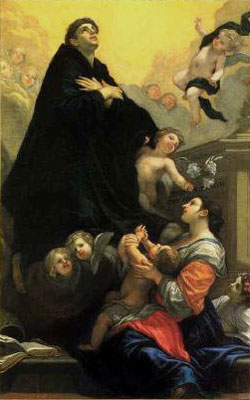Catholic Social Doctrine: Morality, Science, and Technology
FREE Catholic Classes
Science and technology, for all their good, are not something ungoverned by moral law. We should not fall into the moral morass of believing that just because we can do something we ought to do something. Often, dazzled by the products of his ingenuity, man views technology as the summum bonum, the greatest good. He fails to see or properly assess the negatives that come with some technological change.
Highlights
Catholic Online (https://www.catholic.org)
5/18/2012 (1 decade ago)
Published in Living Faith
Keywords: technology, morality, cloning, in vitro, robotics, technological, freedom, culture, utilitarian, Andrew M. Greenwell
CORPUS CHRISTI, TX (Catholic Online) - Science and its more practical sister technology perhaps more than anything else color the modern world and affect its thinking, its concept of the possible, its activity, and its communication. There are things today we think of--the genome, a black hole, quarks, leptons, and bosons--that man could not even have imagined three generations ago.
There are things that are possible today--in vitro fertilization, in utero surgery, cloning, the manufacture of nanochips--that were but the stuff of novels a generation ago. Modern computers and modern communications--the Internet and its associated media--have ushered in a revolution no less significant than the advent of removable-type printing, radically affecting how man deals with other men and how man deals with his problems.
Often, dazzled by the products of his ingenuity, man views technology as the summum bonum, the greatest good. He fails to see or properly assess the negatives that come with some technological change. As a result, there is a danger that instead of technology freeing man, man could be enslaving himself to it. As the Catholic writer Georges Bernanos wrote in his Last Essays, modernity confronts a new man deeply affected by technology:
"[I]n a fabulously short time, by the single miracle of technology and of all techniques, including that which not only allows the control of worldwide opinion but also the making of it, it has created a civilization in the image of a prodigiously diminished and shrunken man, a man no longer made in the image of God, but in the image of the speculator . . . ."
It is this danger of science of technology, and technology's products (which Bernanos comprehends with the term "machine" understood broadly) which must be addressed. It is not a question of ridding the world of science, technology, and machines, but of assuring that man's spiritual nature, his moral stature, grows in a manner commensurate with his scientific and technological acumen.
As Bernanos put it: "No, it is not a question of destroying machines but of elevating man, of restoring in him faith in the freedom of his soul and an awareness of his dignity." Unless we are aware of the problem, we do not perceive the threat. And it is a threat that is very real, since, ultimately, it is a question of "knowing who will win, technology or man." Lest he destroy himself and his kind, homo faber must also be homo sapiens and also homo religiosus.
The Compendium of the Social Doctrine of the Church briefly addresses the issue of science and technology and man. "The results of science and technology are, in themselves, positive" it states. Science and technology are viewed as a participation in God's creative activity. Quoting Vatican II's Gaudium et spes, the Compendium states without reserve: "Far from thinking that works produced by man's own talent and energy are in opposition to God's power, and that the rational creature exists as a kind of rival to the Creator, Christians are convinced that the triumphs of the human race are a sign of God's grace and the flowering of His own mysterious design." (Compendium, No. 457)
"[T]he Catholic Church is in no way opposed to progress, rather she considers 'science and technology are the wonderful product of a God-given human creativity, since they have provided us with wonderful possibilities, and we all gratefully benefit from them.'" (Compendium, No. 457)
But science and technology, for all their good, are not something ungoverned by moral law. We should not fall into the moral morass of believing that just because we can do something we ought to do something. This would be to fall into a sort of Humean fallacy, jumping from an "is" to an "ought."
For this reason, the Church--without detracting from the positive good that science and technology bring us--also observes that "the greater man's power becomes" as a result of scientific and technological progress, "the farther his individual and community responsibility extends," and the more obligation there is to assure that it "correspond, according to the design and will of God, to humanity's true good." (Compendium, No. 457)
To assure that science and technology are at the service of man, and not at the service of only a small faction of men, the moral law must govern its use:
"It is important," the Compendium states, "to repeat the concept of 'proper application,' for 'we know that this potential is not neutral: it can be used either for man's progress or for his degradation.' For this reason, 'it is necessary to maintain an attitude of prudence and attentively sift out the nature, end, and means of the various forms of applied technology. Scientists, therefore, must 'truly use their research and technical sill in the service of humanity,' being able to subordinate them 'to moral principles and values, which respect and realize in its fullness the dignity of man.'" (Compendium, No. 458)
Ultimately, science and technology must see themselves as cooperating with nature, not setting up a reality that contradicts or nullifies nature. Any applied technology--particularly those dealing with genetic or biological manipulation--"must take into account the nature of each being and of its mutual connection in an ordered system."
Quoting Blessed John Paul II's Centesimus annus, the Compendium's teaching is worth quoting in full:
"Man, then, must never forget that "his capacity to transform and in a certain sense create the world through his own work . . . is always based on God's prior and original gift of the things that are." He must not "make arbitrary use of the earth, subjecting it without restraint to his will, as though it did not have its own requisites and a prior God-given purpose, which man can indeed develop but must not betray." When he acts in this way, "instead of carrying out his role as a co-operator with God in the work of creation, man sets himself up in place of God and thus ends up provoking a rebellion on the part of nature, which is more tyrannized than governed by him." If man intervenes in nature without abusing it or damaging it, we can say that he "intervenes not in order to modify nature but to foster its development in its own life, that of the creation that God intended. While working in this obviously delicate area, the researcher adheres to the design of God. God willed that man be the king of creation." In the end, it is God himself who offers to men and women the honor of cooperating with the full force of their intelligence in the work of creation." (Compendium, No. 460) (quotes are from JPII, Centesimus annus, 37)
In short, we must remember that we are creatures, and that we--like all of nature--have been made by God. We must remember that he has made us in our inward parts, that he wove us in our mother's womb, and that we are fearfully and wonderfully made, and that all of nature with us is wonderful.
Mirabilia opera tua et anima mea novit nimis. "Wonderful all your works, and my soul knows it very well." (Ps. 139 [138]: 14)
This is the prayer that ought to be on the lips and in mind of the scientist and the purveyor of technology.
-----
Andrew M. Greenwell is an attorney licensed to practice law in Texas, practicing in Corpus Christi, Texas. He is married with three children. He maintains a blog entirely devoted to the natural law called Lex Christianorum. You can contact Andrew at agreenwell@harris-greenwell.com.
---
'Help Give every Student and Teacher FREE resources for a world-class Moral Catholic Education'
Copyright 2021 - Distributed by Catholic Online
Join the Movement
When you sign up below, you don't just join an email list - you're joining an entire movement for Free world class Catholic education.
-

- Easter / Lent
- Ascension Day
- 7 Morning Prayers
- Mysteries of the Rosary
- Litany of the Bl. Virgin Mary
- Popular Saints
- Popular Prayers
- Female Saints
- Saint Feast Days by Month
- Stations of the Cross
- St. Francis of Assisi
- St. Michael the Archangel
- The Apostles' Creed
- Unfailing Prayer to St. Anthony
- Pray the Rosary
Enough Is Enough: Why Taylor Swift Symbolizes the Idolatry of Wealth
Crowned with Grace: Understanding the Queenship of Mary
Gaza Officially in Famine, U.N. Warns of ‘Failure of Humanity’
Daily Catholic
 Daily Readings for Saturday, August 23, 2025
Daily Readings for Saturday, August 23, 2025 St. Philip Benizi: Saint of the Day for Saturday, August 23, 2025
St. Philip Benizi: Saint of the Day for Saturday, August 23, 2025 A Prayer for a Sick Child: Prayer of the Day for Saturday, August 23, 2025
A Prayer for a Sick Child: Prayer of the Day for Saturday, August 23, 2025 Daily Readings for Friday, August 22, 2025
Daily Readings for Friday, August 22, 2025St. Andrew the Scot: Saint of the Day for Friday, August 22, 2025
- Adoration Prayer : Prayer of the Day for Friday, August 22, 2025
![]()
Copyright 2025 Catholic Online. All materials contained on this site, whether written, audible or visual are the exclusive property of Catholic Online and are protected under U.S. and International copyright laws, © Copyright 2025 Catholic Online. Any unauthorized use, without prior written consent of Catholic Online is strictly forbidden and prohibited.
Catholic Online is a Project of Your Catholic Voice Foundation, a Not-for-Profit Corporation. Your Catholic Voice Foundation has been granted a recognition of tax exemption under Section 501(c)(3) of the Internal Revenue Code. Federal Tax Identification Number: 81-0596847. Your gift is tax-deductible as allowed by law.





 Daily Readings for Saturday, August 23, 2025
Daily Readings for Saturday, August 23, 2025 St. Philip Benizi: Saint of the Day for Saturday, August 23, 2025
St. Philip Benizi: Saint of the Day for Saturday, August 23, 2025 A Prayer for a Sick Child: Prayer of the Day for Saturday, August 23, 2025
A Prayer for a Sick Child: Prayer of the Day for Saturday, August 23, 2025 St. Andrew the Scot: Saint of the Day for Friday, August 22, 2025
St. Andrew the Scot: Saint of the Day for Friday, August 22, 2025

